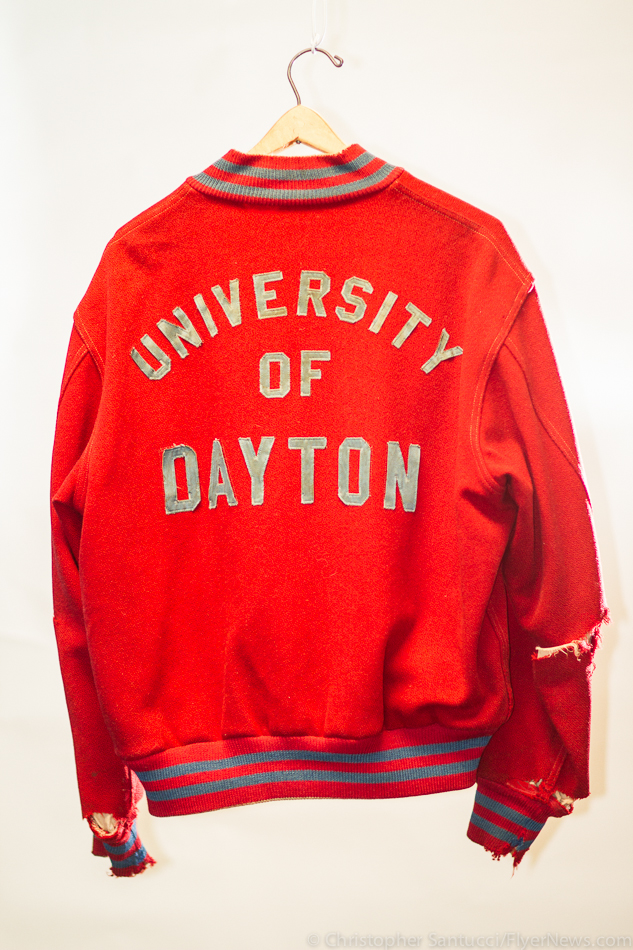UD alumnus, veteran legacy lives on through ‘60s jacket
By: Alise Jarmusz – Asst. News Editor
On Veteran’s Day, we honor those who have dedicated their lives to serve our country. As a University of Dayton community, we remember one of our own: Capt. Joseph S. Rose Jr., a 1964 graduate who was killed in action in Vietnam in 1967.
Just before Veteran’s Day, a very special jacket reappeared out of John Rose’s closet. John Rose, who is Joseph Rose Jr.’s youngest brother, had kept his older brother’s jacket safe for almost 50 years.
The jacket, slightly worn from use over the years, carries significant meaning within its fabric. Joseph Rose Jr. originally bought it from the University of Dayton bookstore, and, according to his friends and family, he wore the striking red and blue jacket almost every day during his time at UD.
Stephan VanHecke, Joseph Rose Jr.’s friend since they were in seventh grade and fellow 1964 graduate, was surprised to see the jacket surface again.
“We would bump into one another almost everyday, and during the winter or when it was cold enough he would be wearing this jacket,” VanHecke said. “I remember him wearing it a lot during those four years at UD.”
“I thought something had happened to it. Then John brought it over to me and said, ‘Do you remember this?’ Then all these other memories came back,” VanHecke said. “So, it brought us here. To tell the story of Joe and all veterans and how this jacket surfaced after all this time right before Veteran’s Day.”
Capt. Joseph S. Rose Jr., known as “Little Man” to his family and close friends, was born Aug. 8, 1942 in Washington, D.C. His family moved from Virginia to Dayton around 1954, where he attended Chaminade High School, now known as Chaminade-Julienne High School, with Steven VanHecke until his graduation in 1960.
Joseph Rose Jr. then attended the University of Dayton, where he joined the ROTC program. According to his older sister Bonnie Rose George, Joseph Rose Jr. was the treasurer of his freshman class, and was an extremely charismatic person.
“Joe could really work a room,” she said.
Joseph Rose Jr. was a huge fan of Flyers basketball and football, played on the intramural volleyball team, frequently caddied at the Miami Valley Country Club and became a respected member of the UD ROTC.
“Joe would never hesitate to help underclassmen or his fellow officers,” John Rose explained. “I was the youngest of six kids. He taught me how to dribble the basketball. He was my hero.”
“It amazes me the number of folks that still remember my brother and speak very fondly of him. I mean on their own they come up to you and say something,” George said. “It takes a very special type of person for that to happen.”
He entered the U.S. Army after receiving his commission upon graduation in 1964. Joseph Rose Jr. first deployed to Korea and later received orders to go to Vietnam in August of 1967. He was killed in action Sept. 14, 1967, when his armored personnel carrier hit a mine.
Joseph Rose Jr. was awarded the Purple Heart for his sacrifice and the Bronze Star Medal for an outstanding display of bravery in combat during a mission a few days before his death.
During an interview with Flyer News, John Rose pulled an old typewritten letter from his pocket. As he unfolded the yellowing paper, he said that the letter was from his cousin, who had run into Joseph Rose Jr. the day before he died in Vietnam.
Bit by bit, John Rose gently read sentences from the letter out loud. “As I write this, you are probably just receiving word that Joe has been killed in action… just the other day during lunch, one of my men escorted a young captain into my mess. I looked up and immediately recognized something familiar about the man… in a split second, I knew it was Joe.”
John Rose continued, “Joe had come in from the field with the rest of his company and battalion for just one day… Joe and I talked for only about 15 minutes… and then he returned to his unit to prepare for the change-of-guard ceremony. At the ceremony, I met Lt. Col. Pelton and asked how Joe was doing. He was very enthusiastic about Joe’s performance and his potential… [It] had merely confirmed my evaluation of Joe. He was a good officer… He went back to the field the next day.”
John read the final words of the letter, “I deeply regret the necessity of writing this letter…Joe was a good infantry officer. To me, there is no higher order of man.”
According to those who knew him, Joseph Rose Jr. was a loyal and dedicated man who put others before himself and embodied what the UD community stands for: respecting and caring for others.
His jacket is a symbol of those values.
“My friend, who also graduated from UD, she believes that certain clothes pick up the aura of the person if they wear it a lot. Just like how Joe wore this jacket a lot,” VanHecke said. “There’s a lot of the essence of Joe still in the jacket. Those memories get absorbed in the fibers.”
John Rose paused to look at the jacket hanging in front of him.
“When I’ve worn it, there’s a closeness, the physical proximity that he had his shoulders on it,” he said. “Seeing that jacket there gives me a lot of love. It’s a love. I don’t throw those words around very often. That’s what it means to me. A love for family and a love for UD.”
The sentence printed on hats worn by veterans of the Vietnam War summarizes their sacrifice: “All gave some, some gave all.”


